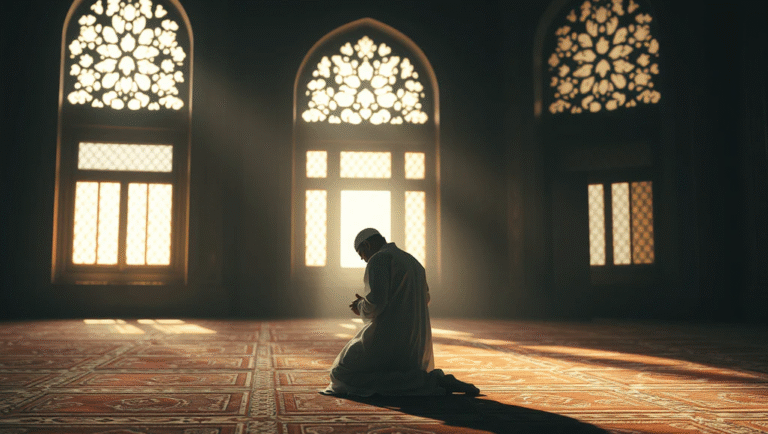Salah is the second pillar of Islam and is major act of worship for Muslim. Salah serve as a reminder to Muslims that worship is not confined to a single day or one location. Because these prayers are offered at various times of the day—dawn, noon, afternoon, evening and night. Believers can continue to focus on Allah throughout the day even they have hectic schedules. Salah provides physical healing and spiritual direction. In contrast to other worship styles that could be periodic. Prayer is an ongoing activity that influences Muslims’ daily schedules and strengthening their Islamic identity.
1. Salah as a Core Act of Worship
Salah is a symbol of loyalty and an order from Allah, not just a formality. The five daily prayers that Muslims must offer are Fajr, Dhuhr, Asr, Maghrib and Isha. Supplications, physical gesture which combine devotion and concentration, and Quranic recitation are all part of every single prayer. No moment of the day goes by without remembering Allah just because of the regular and systematic scheduling of Salah. Praying at any time of day or night serve as a reminder to the Muslims. Life is temporary and that maintaining a relationship with a Creator is the key to success. Faith I stays alive and the soul remains safe from neglect by this continuous rhythm of worship.
2. Spiritual Benefits of Salah
Salah is the backbone of believer’s inner strength due to its infinite spiritual benefits.
- Relationship with Allah: When believers pray, they are bringing themselves closer to Allah. Belief and hope are strengthen by prayer
- Purification of the Heart: Regular prayers purify the heart from sins, negative thoughts and pride, giving purity and tranquillity into daily life.
- Discipline and self-control: Muslims learn to organize their days around worship by developing punctuality, tolerance and consistency through the fixed times of prayers.
- Inner peace and calmness: By converting stress into duas and finding peace into Allah’s mercy, Salah helps people to feel less anxious and depressed.
- Strengthening Faith: Prayers strengthen faith by reminding believers Allah’s presence in every aspects of life.
Salah becomes a source of light in Muslim’s life with these spiritual benefits, guarding heart from depression, pride and negligence.
3. Physical Benefits of Salah
Salah has enormous physical benefits in addition to spiritual ones. Standing, bending and prostrating during prayer are all intentional physical postures which are not random, they are planned to promote mental and physical human health.
- Improve blood circulation: Healthy blood flow, especially to the brain is encouraged by posture shifts during each prayer, which is like having a private conversation with Allah.
- Posture and flexibility: Strengthening of the spine, stretching of the muscle and improving flexibility all are achieved thorough the movements like bowing (ruku) and prostrating (sujood).
- Muscle and joint exercise: Even for people who has inactive lifestyle, Salah serve as a mild type of exercise that is performed several times a day to keep body active.
- Breathing Regulation: Systematic or consistent breathing during prayer recitation fosters calm and improved lung function.
- Stress Reduction: By combining spiritual concentration with physical stillness, stress levels are lowered and overall good health is enhanced.
These physical benefits shows that Salah is not only nurtures the soul but also helps people to stay balanced and healthy.
4. The Role of Salah in Daily Life
Muslim’s daily routine is influenced by Salah, which change their behaviours and priorities. People who pray five times a day regularly, that routine puts their faith above materialistic distraction. It gives an escape to students from their studies so they can concentrate again. In the middle of hectic schedules of workers, it provides a chance of relax and think. Praying together promotes unity, affection and shared belief in families. Because Muslims of all status and ages stand side-by-side before Allah in prayer, Salah also promotes equality. Salah plays a function in society that goes beyond the individual by developing an atmosphere of unity, modesty and shared dedication.
5. Salah as a Source of Strength in Trials
As life is full with difficulties and hurdles, Salah supplies believers the resources they need to overcome these challenges with courage and tolerance. Muslims are reminded while standing in prayer that Allah’s mercy is bigger than any difficulties and that their difficulties are only short-term. When the forehead meets the floor during prostration, it shows humble and total faith in Allah. Believers are reminded that submission to the Allah is the source of true strength by this position alone, which shows surrender. Muslims who pray regularly, experience healing in the time of sorrow, courage in the phase of misfortune and clarity in decision-making. It turns hardships into chances to deepen your faith.
6. Enhancing the Quality of Salah
Although is necessary to pray regularly, improving the quality of Salah makes the experience more fulfilling. Believers are urged to;
- Avoid all distracting things and offer prayers with complete focus.
- Understanding the meaning or Quranic verses that are recited.
- Offer your prayers carefully and peacefully without hurrying.
- To get more rewards, perform your obligatory prayers such as Sunnah and Nafl.
By ensuring that Salah is genuine and heartfelt and not robotic, these practices increase spiritual benefits and strengthen relationship with Allah.
Conclusion
With its combination of spiritual and physical benefits that boost a believer’s life, Salah is the core of Islam. It builds up belief, maintain a believer’s connection with Allah and cleanse the soul. Salah is also improving health and overall wellness. Salah is a gift that fills daily life with calm, discipline and gives purpose to live life. Muslims can able to understand Salah’s function as a source of guidance, power and healing, by appreciating its both inner and outer aspects.
